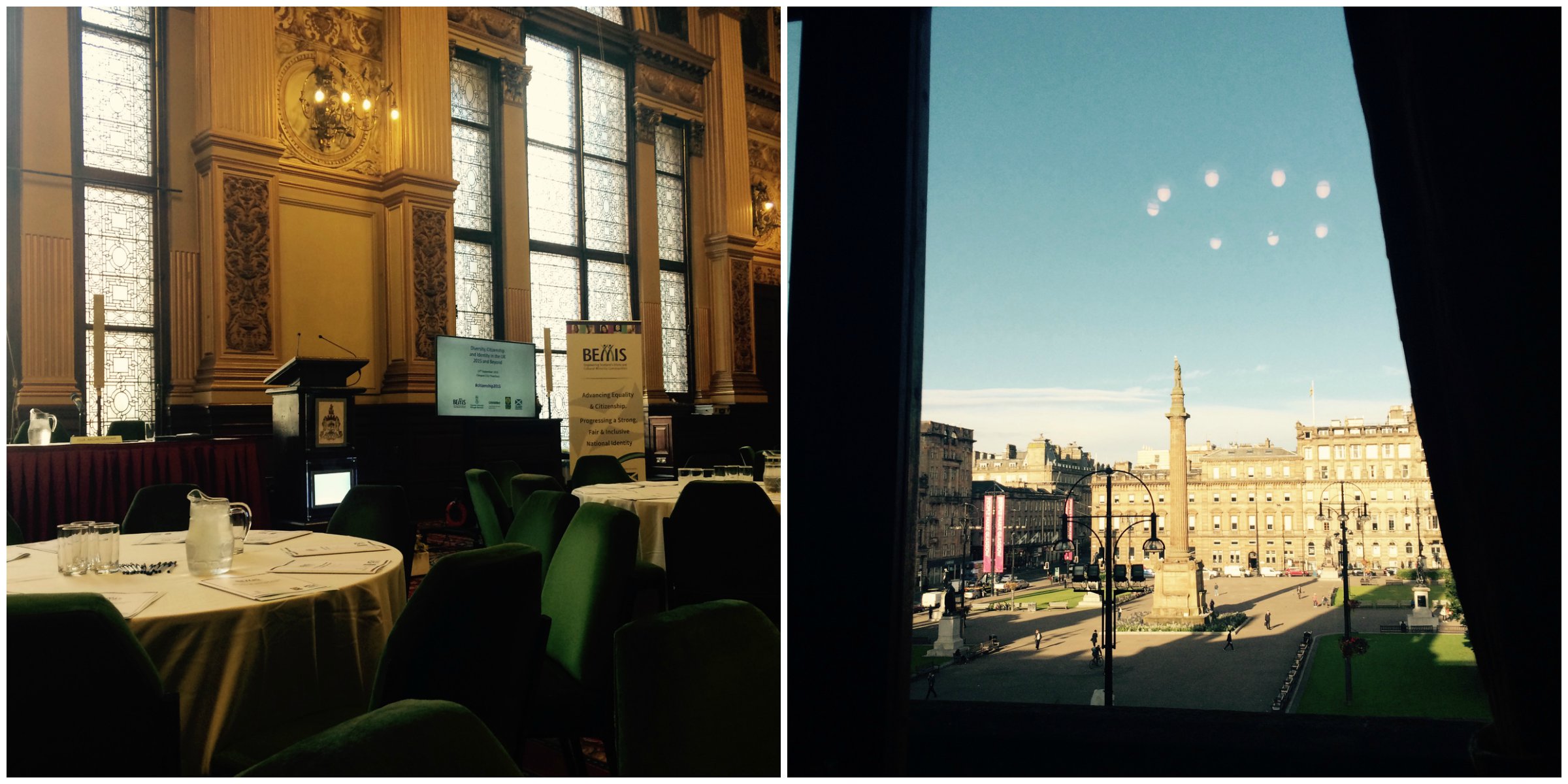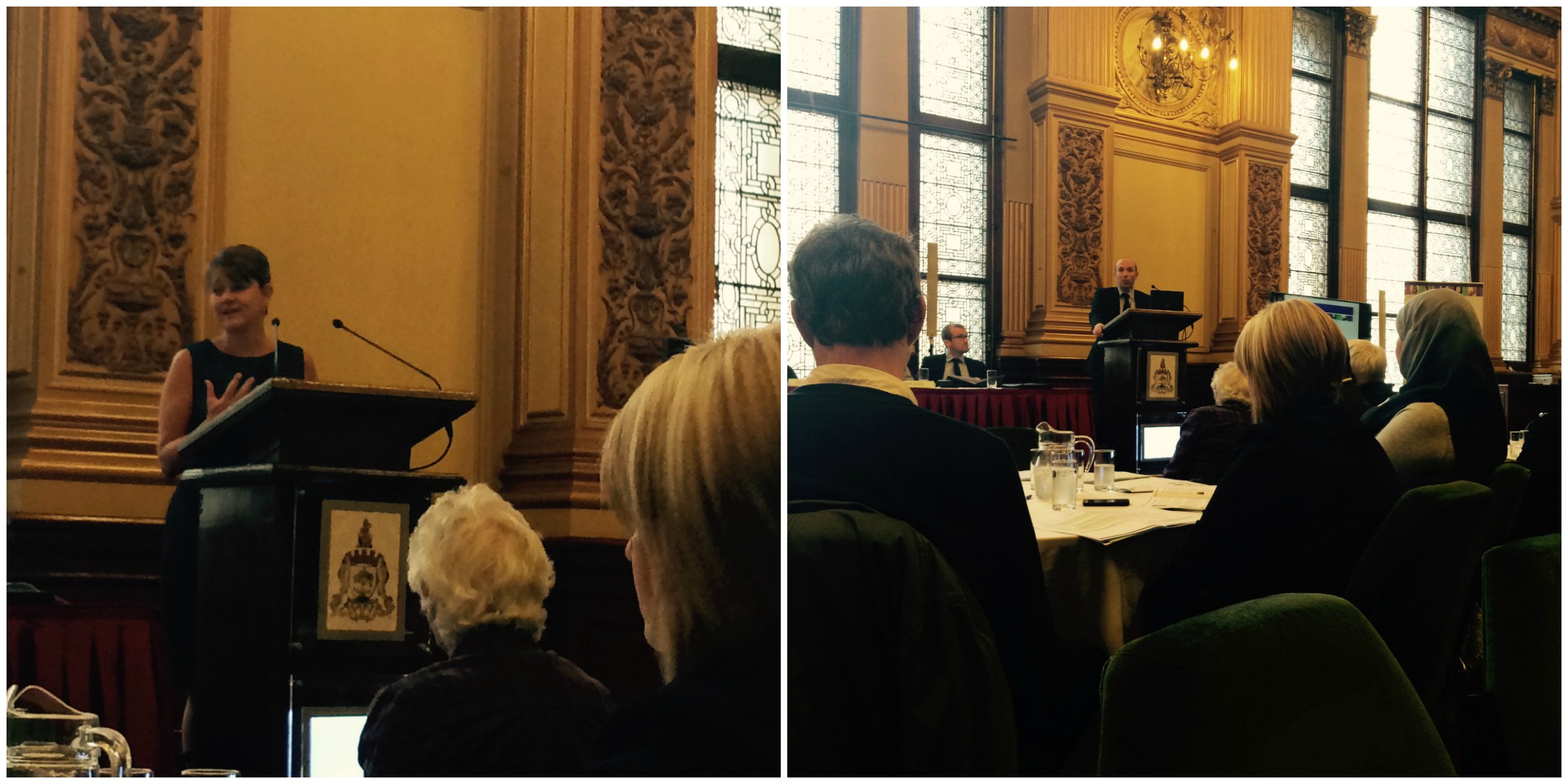By Rebecca Jackson
361 days since Scotland went to the polls in the 2014 independence referendum, and in the context of the current political climate regarding displaced peoples and refugees, BEMIS hosted a conference on Monday in Glasgow to consider citizenship and identity in the UK.
The conference was supported by the University of Swansea, the Scottish Government and GRAMNet (Glasgow Refugee Asylum and Migration network) which is based at the University of Glasgow.
Delegates came from across Scotland (and Wales) with representatives from a diverse range of community groups, local government, and universities to discuss Scottish identity and citizenship, and how it applies to them.
Key values of inclusion
The morning began with an address by Dr Rami Ousta, the CEO of BEMIS, one of the conference organisers. Dr Ousta spoke at length about the key values which he believes are inherent within Scotland. Values, he said, which make Scotland a fair and inclusive place for ethnic minorities to live. He said he believed that identity and belonging should not hinge on terminology but that this is something which he felt some individuals had become “constrained by”.
Dr Ousta emphasised the importance of active citizenship – stating that “minority groups should engage to compliment government efforts” and that the role of the current generation was to “create and promote discussion for the benefit of future generations.”
What it is to be a citizen
Then the politicians took the floor, with Marco Biagi MSP beginning, followed by Leanne Wood. Mr Biagi (Minister for Local Government and Community Empowerment) opened by stating that he felt that September 2014 to September 2015 had been a massive year for citizenship and identity in Scotland. People in Scotland were, as he put it “engaging as citizens like never before.” The independence referendum was, he thought, the representation of the civil understanding of what it is to be Scottish.
He highlighted his role as an example of the Scottish government’s focus on delivering a change in how they approached what he called the “democratic promotion agenda”. He highlighted upcoming citizen’s forum events and emphasised the necessity for Scotland’s institutions to be representative if they are to engage individuals from across different communities in political participation in Scotland.
Leanne Wood (Leader of Plaid Cymru) also highlighted the referendum as a key moment in the democratic realisation of citizenship in Scotland. She focussed on the idea of nationhood and nation building, touching on similarities and differences in the experiences and contexts in Scotland and those in Wales. She emphasised the ability of Scots to promote a more egalitarian agenda, as Scotland provides a more distant space from the rise of the far right which has been seen in England and Wales. She spoke of “journeys to civic nationalism“, both in Scotland and in Wales.
The view from the floor
Following a brief Q&A, delegates highlighted the importance of the conference to the current refugee crisis. There was a discussion around the application of Scottish government proposals from a local authority perspective – how could local authorities use the power they have to promote this inclusive agenda ‘on the ground’.
The speakers were challenged on their generalisation of the issue of integrating more migrant communities in Scotland and that the way they had described it was very different to the realities being seen on the ground. There were references to hate crime and isolated communities within Glasgow which were issues which some delegates felt were not being addressed by the Scottish government.
There was also a question regarding the participation of minority groups in local councils to which Mr Biagi responded by saying that local authorities “still have a long way to go to be representative of women, minority groups and disabled people” but stressed that “community planning, which could define an inclusive and participative citizenship, is vital and is something the Scottish government are working towards.”
A move away from paternalism
The morning was rounded off by a foray into the world of academia. Firstly Dr John McKendrick from Glasgow Caledonian University spoke about child poverty in Scotland, the recent EIS document on Child Poverty and how in order to generate a sense of citizenship within Scotland, Scotland’s problems should be tackled cooperatively.
He reiterated the point raised earlier, that Scotland “is not as egalitarian as the public debate would have us believe.” But he suggested that the referendum could act as a turning point to create a fairer Scotland and offered an opportunity to rethink how society integrates and acknowledges different viewpoints.
Finally, Professor James Mitchell from the University of Edinburgh, spoke of the influence of the independence referendum in relation to the Christie Report, which he was involved in drafting. He spoke of using public policy as a way to engage people, rejecting the traditional paternalistic approach of policy makers who did things for people, not with them.
He discussed how government, both central and local, should use the appetite for participation which the referendum created in Scotland and translate this into everyday decision-making processes. Summarising, he stressed that in his opinion, the question of citizenship is important because communities are now key to leading the public policy agenda in Scotland.
Final thoughts
Although interesting and useful in generating discussion (the follow- on interactive workshop sessions in particular), the discussions appeared to emphasise what many people in the room already knew. When questioned on practical tangible differences that could be made, delegates were reminded by the speakers that the Scottish Government has no power over asylum and immigration, as those matters remain reserved; and that changing cultural values to help integrate communities would be a long and slow process.
What the conference did do was raise the issue of citizenship up the agenda again in Scotland and highlight to those who were there the improvements which have been made. It also emphasised the wide spectrum of people willing and eager to cooperate and interact to make Scotland a fairer, more equal and more enjoyable place to live, and that is, as one speaker summarised, a positive sign for the future.
The BEMIS “Diversity, citizenship and identity in the UK – 2015 and beyond” conference was held in Glasgow City Chambers on 14 September 2015.
Who was speaking?
- Dr Rami Ousta, CEO BEMIS Scotland
- Marco Biagi MSP, Minister for Local Government and Community Empowerment
- Leanne Wood AM, Leader of Plaid Cymru, Member of the National Assembly for Wales, South Wales Central Region
- Professor James Mitchell, University of Edinburgh
- Dr John McKendrick, Glasgow Caledonian University
Share
Related Posts
Tackling geographical inequalities is critical for ensuring that all parts of the country have the potential to prosper. When the UK was a member of the European Union, it was entitled to a share of funding from the EU’s structural ....
In recent years, there has been an increasing focus on ensuring people with ‘lived experience’ are involved in co-producing research and policy-making at practical, local level. However, there has been little discussion around what the people with lived experience themselves ....
By Robert Kelk and Chris Drake A new start for an old challenge? The recent appointment of Marc Lemaître as the European Commission’s director general for research and innovation (R&I) has returned Europe’s R&I gap to the spotlight. Previously head ....
Today sees the start of Community Garden Week 2023. Across the UK, communities will be celebrating the many and varied types of community gardens, from children’s and neighbourhood gardens to therapy gardens and allotments. The benefits of community gardens are ....


